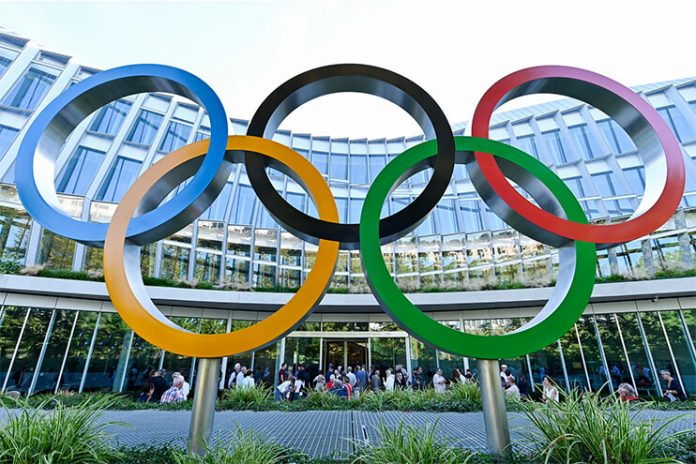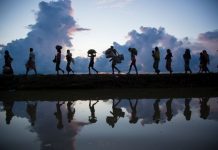This article is written by Gitika Wadhwani, from Jagran Lakecity University. This is an exhaustive article dealing with the 2020 Summer Olympics, problems faced by Japan, and the reason for the non-postponement of the Summer Olympics in 2021.
Table of Contents
About the 2020 summer Olympics
The Summer Olympic games also known as the Games of the olympiad is a major international event held once every four years. Last summer Olympics were held in 2016 in Rio de Janeiro, Brazil. The 2020 summer Olympics were to take place in Tokyo, Japan. During the 125th International Olympic Committee (IOC) session in Buenos Aires, Argentina in 2013 Tokyo was selected as the host city for the 2020 Olympics. Japan will be hosting the summer Olympics for the second time, the first time it was held in 1964.
Postponement due to Covid outbreak
The summer Olympics were originally scheduled to take place from July 24 to August 9, 2020, but due to the Covid pandemic, it was postponed. They were rescheduled to be held in 2021. Before March the Japanese government requested the schools to be closed from March, various schools were closed in march though the number of Covid cases was only about 250. The Olympic games were to be held in July, 2020. People from Japan and other countries highly criticized the government for scheduling the games during this pandemic. Eventually, the government had to postpone the Olympics by one year.
It has never happened in history that the Olympic games were cancelled for any public health reasons. But it may get cancelled if COVID-19 cases continue to rise. The postponement of the Tokyo Summer Olympics has really affected the country. Olympics facilitate economic growth by generating revenue through a large number of spectators and tourists who visit to enjoy the sporting event. On one hand, there is a huge economic loss to the country, especially the hospitality industry who has suffered a huge loss of revenue. Before the postponement, it was expected that Tokyo would receive approximately 20 million visitors, 70,000 volunteers for the games, and 8,000 for the city. Around 11,090 Olympic athletes and 4,400 paralympic athletes were expected to participate. Around 14 million dishes were expected to be delivered to the participants. This sporting event was not limited to recreation but was a huge prospect for economic growth for Tokyo. But due to Covid, the event was postponed to safeguard the health of athletes.
Olympic Charter and other related important legal documents
Every sports tournament is governed by a certain set of rules made by an organising committee. The Olympic Games are no exception to it. The Olympic Charter is a framework that sets rules and guidelines for organising Olympic games and governing the Olympic movement. It was adopted by the International Olympic Committee and was last revised on 17th July, 2020 during the 136th IOC session. The Olympic charter serves three main purposes:
- It sets the principles and values of Olympism.
- It serves as a legal framework for the IOC.
- It defines the rights and obligations of the IOC, the international federation and the national Olympic committees, and the organising committees for Olympic games.
Main features of the Olympic Charter
The Olympic Charter consists of 6 chapters and 61 Articles. Its main features are as follows:
1. The Olympic movement
Article 1- The Olympic movement comprises organisations, athletes, and other persons who are willing to be abided by the Olympic charter.
Article 2- The mission of the IOC is to promote Olympism and to lead the Olympic movement. IOC encourages and supports the promotion of ethics and educating youths. Facilitating sports competitions strengthen the unity of the Olympic movement, support the promotion of women in sport, take measures on the health and safety of athletes, etc.
Article 6- The Olympic Games are a competition between individuals or teams not between countries. Athletes are selected by their NOCs and entries are accepted by the IOC.
Article 8- The Olympic symbol consists of five interwoven rings of equal size in five different colours: blue, black, and red rings at the top, the yellow and green rings at the bottom.
2. The International Olympic Committee (IOC)
This chapter in the Olympic charter deals with:
- The legal status of IOC;
- The composition of IOC;
- The organization of IOC;
- Commissions of IOC;
- Official languages of IOC.
3. The international federations (IFs)
This chapter outlines the:
- Recognition of IFs;
- The mission of IFs within the Olympic movement- to make and enforce rules for their respective sports as per the Olympic spirit, development of sports throughout the world, contributing in achieving goals set under the Olympic charter, assisting IOC to review candidates for Olympic games, promote health and safety measures of sports athletes;
- Role of IFs- formulate proposals related to Olympic charter and the Olympic movement, assist in preparing for Olympic congresses, participate in activities of IOC commissions on IOCs request.
4. The National Olympic Committees (NOCs)
The mission of NOCs is to promote and develop the Olympic movement in their respective countries. The role of NOCs is to promote the principles of Olympism, ensure the abidance of the Olympic charter, encourage higher performance sports, and provide training to contribute to the principles of Olympism.
5. The Olympic games
This chapter deals with the celebration of the Olympic games, selection of location, organisation of games, role of IFs in Olympic games, and authority of the IOC.
6. Measures and sanctions
This chapter states what measures or sanctions can be taken in case of violation of the Olympic Charter, the World Anti-doping Code, the Olympic Movement Code, or any other regulation. Also, it deals with dispute resolution by the IOC and the Court of Arbitration for Sports (CAS).
Olympic Movement Code (2015) on the Prevention of the Manipulation of Competitions
This Code provides a harmonized regulation to sports organisations to prevent the risk of manipulation in the competitions. Betting, manipulation of sports competitions, corrupt conduct, using inside information, failure to report, and cooperation are all considered violations of the code. Violation of Code in any form may call for a disciplinary procedure by the sports organisation. The participant who has been alleged to have violated the Code should be informed and an investigation can be done. The burden of proof to establish the violation of Code lies on the sports organisation, during the whole procedure the organisation shall maintain confidentiality. Further, provisional measures such as provisional suspension can be done if there is any risk to the reputation of the sport. Once the violation is proved, the sports organisation should impose a reasonable and appropriate sanction on the participant. The Code is binding on all sports organisations under the Olympic Charter and any amendment to this Code needs to be approved by the IOC executive board.
World Anti-Doping Code (2021)
This Code is a core document that provides a harmonized framework for anti-doping policies, rules, and regulations all around the world for sports organisations and among public authorities. Approximately 700 sports organisations have accepted this Code including IOC and IFs. This Code aims to promote healthy and fair, doping-free sports. And to harmonize the rules at the national and international levels. This Code prescribes the circumstances which constitute the anti-doping rule violation, burden of proof, testing and investigation, notice and provisional measures, trial procedure, sanctions against individuals, teams, and sports organisations, implementing decisions and roles and responsibilities of IOC, NSFs.
LGBT laws in Japan – how is Japan’s legal stand on same-sex relationships affecting its image during the Olympics
Same-sex relationships were never considered illegal in Japan. Only in 1873, sodomy was criminalized by the criminal code but the law was repealed in 1882. There is no criminalization of same-sex relationships in Japan since. There is no separate statute that recognizes same-sex marriages in Japan. Only Article 24 of the Japanese Constitution provides for marriage between men and women through mutual consent having equal rights. But it is under debate whether this applies to only men and women or LGBT community also have equal rights. Due to the lack of legal recognition, same-sex couples face difficulties in their lives.
In 2016, the opposition parties submitted a Bill to eliminate discrimination based on sexual orientation and gender identity, the ruling party presented an outline of the Bill only at promoting a tolerant society. This Bill was criticized by many LGBTQ rights organizations for not containing any mention of the prohibition of discrimination based on sexual orientation and gender identity. During the internal process of approving the cross-party Bill, several conservative LDP lawmakers said that it “could cause confusion by increasing trials on the grounds of discrimination”.
Many discriminatory remarks were made during the discussion. The Bill was not submitted to Japan’s national diet and is still open to debate. In Japan, 2020 Olympics were scheduled to be held which are rescheduled in 2021, many LGBTQ rights organisations sent a letter to the Japanese Prime Minister requesting to enact an anti-discrimination law to keep up with the Olympic charter ban on “discrimination of any kind”. The groups are running an #EqualityActJapan campaign to prohibit discrimination and pass a law to protect the LGBT community. The Olympic games give a wonderful opportunity to Japan to pass anti-discrimination laws and to stand in solidarity with the LBT community in Japan. All eyes are set on Japan, by enacting the law on protection from discrimination Japan can prove that it supports the Olympic spirit.
Why is Japan facing trouble managing the summer Olympics?
The Tokyo Olympics are just to start but Japan is facing the fourth wave of the COVID-19 pandemic. Prime Minister, Yoshihide Suga has announced an emergency in nine prefectures of the country including Tokyo. Japan’s vaccine rollout has been the slowest among all the developed countries. It started vaccinating people from February much later than other developed countries. People are criticizing the government’s decision to host the Summer Olympics and calling for postponement or cancellation.
Rising COVID cases in the country
Japan reported 1,400 new infections every day but the case number is falling from a peak of more than 6000 that was reported in mid-may. Experts said that to conduct games safely the infection rate needs to fall below 100 in the city of Tokyo. In Japan, around 8.7% of the population is fully vaccinated with a second dose. But the situation is still not under control and the majority of people did not want Tokyo to hold the Olympics.
Allegations of bribery
Tokyo Olympics were postponed to 2021 due to the COVID-19 pandemic, it is facing scrutiny over allegations that Tokyo’s bid to host the games was secured by millions of dollars in bribes laundering. A team of dozens of French prosecutors and police investigators is investigating the allegations of corruption. Tsunekazu Takeda, President of the Japanese Olympic Committee was alleged with a bribery scandal that is suspected to help Tokyo to organise the 2021 summer Olympics. Mr. Takeda denied the corruption allegations against him. Takeda is also a powerful member of the Japanese Olympic Committee and the head of its marketing commission. He holds this position by virtue of the Japanese presidency. Takeda has resigned and said he will leave the Japanese Olympic Committee Chairmanship and committee membership. Takeda is being replaced by Yasuhiro Yamashita, a gold medalist in judo at the 1984 Olympics.
Takeda acknowledged that he signed about $2 million payments to a Singapore consulting company, Black Tidings, and its head Ian Tan Tong Han. French investigators linked Black Tidings to Papa Massata Diack, a son of powerful ex-International Olympic Committee member Lamoine Diack of Senegal who had a huge influence over Olympic voters in Africa. International Olympic Committee members voted for Tokyo in 2013 eliminating Istanbul and Madrid. Takeda said he was not involved in the decision-making process and it’s a regular commercial contact approved by others at Japanese Olympic Committee. Dentsu, the Japanese advertising and marketing agency giant, was also under light, Dentsu acknowledged that it advised the Japanese bid committee about bid consultants just before the International Olympic Committee vote in 2013 and Tan was among them.
The Fukushima Daiichi nuclear disaster – it’s radiations and effect on athletes
The Tohoku earthquake caused the tsunami, disabling the power supply and cooling of three Fukushima Daiichi reactors on 11 March, 2011 and the emergence of radioactive isotopes commencing on 12 March, 2011. The Fukushima accident was rated Level 7 on the International Nuclear and Radiological Event scale, due to high radioactive releases over days 4-6. The Fukushima nuclear power plant (NPP) had six separate boiling water reactors made by General Electric (GE) and maintained by the Tokyo Electric Power company (TEPCO). Reactor 4 was de-fuelled when the incident took place, and reactors 5 and 6 were in a cold shutdown for planned maintenance. When the earthquake hit, reactors 1-3 were automatically shut down by the insertion of control rods. Then emergency generators came into play to provide power supply for the electronics and coolant devices, which operated till the tsunami struck. Levels of radiation have decreased through the massive programme by the government to remove the top layer of the soil in affected areas.
But till 2020, about 6.7 million of the black bags were still stored in Fukushima. While the plant’s operator managed to stabilize the damaged reactors, melted nuclear fuel that was buried deep into the ground below the plant is still to be located and removed which will take at least four more decades. At the end of 2019, Greenpeace conducted radiation measurements around J-village where the Olympic torch relay kicked off and found several hotspots. The level of radiation was as high as 71 microsieverts per hour at surface level, 1,775 times higher before the Fukushima disaster. The sports complex lies only 20 km south of Japan’s Fukushima Daiichi nuclear power plant. The ex-Prime Minister Shinzo Abe held the sporting mega-event as a way to show that Japan had overcome the disaster and to promote the development of infrastructure in the region. But the radiation is still prevalent and it may cause different health issues to the athletes if the Olympic games take place in Tokyo.
Sexist comments by JOC head and his reluctant resignation
Yoshiro Mori, the 83-year-old former Prime Minister and the President of the Tokyo 2020 Olympic games organising committee have sparked controversy after he commented that female members of the Japanese Olympic Committee (JOC) talk too much and a board meeting including many women would take time. The comment was in response to the JOC’s policy for increasing the ratio of female directors to 40 percent. These comments set off a firestorm in Japan and abroad, adding to the existing problems surrounding the Olympic games. Mori was insisted to apologize, but his refusal to resign from his post led to the movement in Japan and outside to force him out. In the lower house session clad in white, the female opposition party legislators protested against Mori’s actions. Mori has apologized and resigned in February from his post.
Another sexist controversy – resignation of Hiroshi Sasaki (creative director of games)
Hiroshi Sasaki, the creative director of the Tokyo Olympic games during a meeting with other planning staff members suggested that Naomi Watanabe, a popular Japanese comedian could appear as an “Olympig” in the opening ceremony. This derogatory comment led to controversy over insensitive remarks towards women. Later, Sasaki apologized and said that he is sorry to Watanabe and people who felt discomfort with such content. Sasaki gave his resignation to Tokyo 2020 President, Seiko Hashimoto.
Plagiarized logo
The Tokyo 2020 Organising Committee in 2015 unveiled to the world the logos for the Olympic and Paralympic games designed by Kenjiro Sano. The logo was designed for the Olympics and around the concept of Unity and abstraction of the letter “T”, with black color which represents diversity. The shape of the circle represents an inclusive world. And the red circle represents the power of every beating heart and the Japanese flag. After some time the Belgian designer Olivier Debie sent a letter to the Japanese organizers claiming that the logo was a copy of his design for the Theatre de Liege which was designed in 2013. Sano denied the allegations and the Tokyo 2020 Marketing Director said that they conducted checks of the trademark before revealing the logo and it was not registered. They defended the design but the logo’s reputation was too affected to be used. Following the accusations of plagiarism, decided to remove it.
The committee decided to hold the first-ever open design competition to find a new logo. Nearly 15,000 submissions were received, four finalists were revealed in 2016. In April, 2020, Tokyo 2020 Emblem Selection Committee revealed the winning design “Harmonized checkered emblem”, designed by Asao Tokolo, a 46-year-old artist. It is composed of three varieties of rectangular shapes that represent different cultures, nationalities, and ways of thinking; the logo incorporates the message of “Unity in diversity”.
Other problems
The small islands, called Dokdo in South Korea and Takeshima in Japan, have been a subject of long-territorial disputes between the two countries. The use of a map that includes the Liancourt Rocks, known as Dokdo in South Korea by the Tokyo Olympic Organizing Committee as a Japanese territory on the Tokyo games website has outraged South Korea. South Korea foreign minister Chung Eui-Yong said that the government will take the severe action possible towards the map posted by the Tokyo Olympic Committee. Japanese government repeatedly said that Dokdo is a Japanese territory based on historical facts and refused to change the map posted on the website. The South Korean government has urged the IOC to consider the issue in the same way as it was handled during the PyeongChang Olympics. The Korean Sport and Olympic Committee asked the IOC to mediate the dispute and ask Japan to remove a reference to South Korea-controlled islands.
Protests by the people against the Olympic games
The Olympic games are just about to start but the majority of the people in Japan are resisting the Olympic games and believe that they should be canceled or postponed due to the Covid situation in Japan. Japanese people do not support the idea that the Olympics can be held safely in Tokyo. Various protests are happening in Japan from metro stations to popular public spots. There is a huge protest against the Olympic games with slogans like ‘No Olympic 2020’, ‘No Olympic anywhere’, ‘Olympics kill the poor’, ‘get out IOC’. People in Japan are furious that despite the Covid situation, authorities are still conducting the Olympics putting public health at risk. They are concerned that the Olympic games may further worsen the situation when people from different parts of the world will come and they might bring new variants of viruses. And the fact that Japan is still in the vaccination process and people are not fully vaccinated raises more concern. The protesters continued to protest and if the games take place in Tokyo as scheduled it might intensify the protests in Japan.
Why is Japan not open to postponing the games again?
The Tokyo 2020 Olympic Games were postponed for the first time due to COVID-19 Pandemic. Still, the situation is not under control and safe in Japan. On one hand, where the people are protesting against the Olympic games, the organisers believe that the games can be held safely by taking proper precautions. In May, when Tokyo was in a state of emergency due to the COVID-19 pandemic the Tokyo medical practitioners Association, wrote an open letter to the Prime Minister of Japan Yoshihide Suga to cancel the games. Various polls were conducted which suggested that the majority of the population want the cancellation of the Olympic games. Even the top athletes in Japan including Hideki Matsuyama, Naomi Osaka, and Kei Nishikori raised concerns about the games. Despite such resistance from people from Japan and abroad the International Olympic Committee and the Japanese government are adamant that they will go ahead with the games and it is unlikely that they will change from this position despite what the situation is in Japan.
After receiving criticism from people and opposition the Japanese government said that they cannot cancel the games as it is not under their authority. As per the contract that Japan signed when they won the bid, the power to cancel the games lies with the IOC. The cancellation of the Olympic games by the Japanese government or local organising committee on their own may call for legal consequences. And if the IOC and Tokyo organising committee together agree to call off the games, it will cause severe financial impacts. And secondly, legal ramifications as both organisers and IOC have contractual obligations towards third parties, like sponsors and broadcasting companies. It will set a bad precedent for future events and Olympic culture.
Japan is already missing out on the revenue generated through foreign fans due to the ban on foreign fans. It has invested billion dollars to organise the Olympics and if the games are canceled it will be a huge loss for the country and various parties involved with the games. It will be hard for athletes in events like wrestling, shooting, or boxing who have been working hard for decades and Olympic games are once in lifetime events for them. The further postponement is not possible as last year’s delay had cost $3.5 billion extra.
Conclusion
The modern Olympic Games’ most popular international sports event is organized every four years, rotating between the Summer and winter Olympics every two years. Since 1896 there have been 28 Summer Olympic games held in 23 cities and 23 winter Olympic Games held in 20 cities. The 2020 summer Olympics that were scheduled in Tokyo, Japan were postponed due to the COVID-19 outbreak. So far there is no improvement in the Covid situation and the Olympics are to be held in July, 2021. There have been various challenges that Japan has been facing in managing the summer Olympics. Covid-19 pandemic being the top challenge, other challenges include allegations of bribery against the president of Japanese organising committee in bidding for the 2020 Olympics in Tokyo, the resignation of ex-prime minister of Japan and creative director of Tokyo Olympic games over sexist comments that caused an outcry in the world. Among other problems, the Fukushima Daiichi Nuclear disaster of 2011 caused a huge concern among people to prevent the 2020 Olympics in Tokyo due to the presence of radiation in nearby areas which may affect the athletes and visitors. The logo of the Olympic games was also challenged to be plagiarised, which was replaced with a new checkered emblem.
After facing numerous problems in organizing the 2020 Olympic games, the struggle is yet not completed. The Japanese government is facing protests from people who are calling for postponement or cancellation of the Olympic games. Because of the Covid situation and slow vaccination, people are not convinced that the Olympics will be safe for the Japanese public. They are insecure that the government is putting public health at stake to organise the Olympic Games. The government is not ready to postpone or cancel the Olympic games any further, because it will cause financial problems and legal issues to the organising committee and IOC. Furthermore, the Japanese government cannot cancel the game unilaterally, the IOC has the power to cancel but is not in favor as it will impact the reputation of Olympic games and the future of sports events and athletes.
References
- https://apnews.com/article/japan-olympic-games-health-coronavirus-pandemic-sports-7fc8d8e3daae66257ae0a79e94a6e0c1
- https://apnews.com/article/tokyo-celebrity-coronavirus-pandemic-japan-olympic-games-5c0f6ce3f828e7ef0b0b2f6008e6a581
- https://www.usatoday.com/in-depth/sports/olympics/2021/05/19/tokyo-summer-olympics-2021-japan-covid-19-protest/5074273001/
- https://america.cgtn.com/2021/06/01/the-heat-tokyo-olympics-controversy
LawSikho has created a telegram group for exchanging legal knowledge, referrals, and various opportunities. You can click on this link and join:
https://t.me/joinchat/J_0YrBa4IBSHdpuTfQO_sA
Follow us on Instagram and subscribe to our YouTube channel for more amazing legal content.
 Serato DJ Crack 2025Serato DJ PRO Crack
Serato DJ Crack 2025Serato DJ PRO Crack











 Allow notifications
Allow notifications


